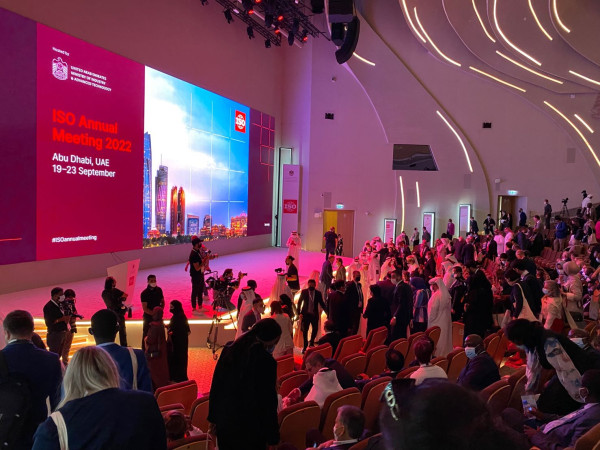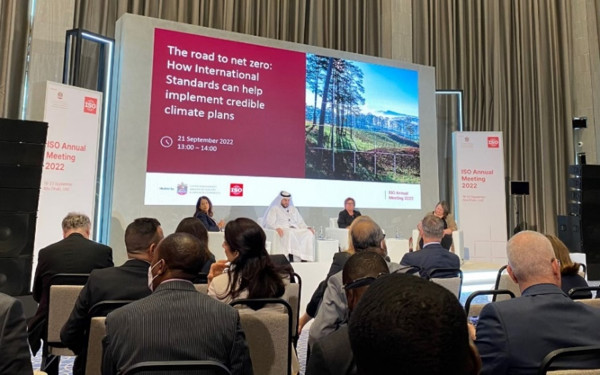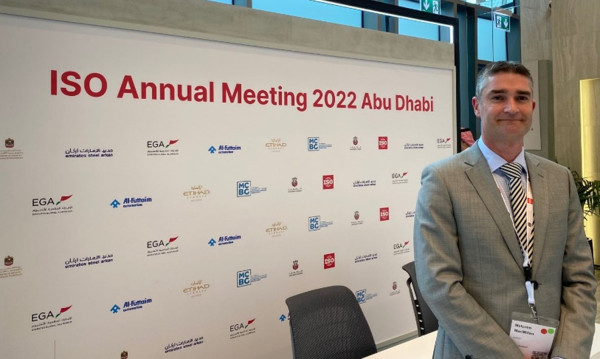Learnings from when the world’s standards bodies came together
What issues and needs bring standards bodies together from across the world? ISO's General Assembly and Annual Meeting helped to find common ground.

ISO Annual Meeting 2022
ISO’s (International Standardization Organisation) General Assembly and Annual Meeting held in Abu Dhabi, the United Arab Emirates in September, saw the world’s largest gathering of standards bodies with nearly 1,000 delegates representing 160 countries.
There was huge diversity in the standards bodies represented - from developing countries to modern first-world nations, and from those with rudimentary set ups to those that are highly sophisticated and digitally innovative. Delegates brought perspectives of a full spectrum of standards products and services. However, finding common ground reflected just how much our world is connected. Standards New Zealand’s National Manager Malcolm MacMillan was on the ground and shares his takeaways from when the world’s national and international standards bodies come together…
Relevancy
Consider our place in time; the speed of change is phenomenal, and this is felt by all standards bodies. With the rapid evolution of the digital economy and digital technologies, there is a need for standards to underpin regulation and protection, but also a great challenge in keeping up with advancements and the pace of change to ensure standards remain relevant and support innovation.
Speed to market
Developing standards, and getting the accuracy and quality that comes from comprehensive involvement takes time and it was widely acknowledged that this is necessary to ensure accuracy, credibility, trust, assurance, and confidence. This can sometimes however also be a weakness in the process when the pace of change is so rapid. ISO recognised the need to improve on its current average development time of 31.2 months and this is echoed through our own practice. To meet the pace of change and meet commissioning bodies’ needs we’ve seen an uptake of more publicly available specifications (PAS), such as those sponsored by EECA (Energy Efficiency and Conservation Authority) for electric vehicles and smart homes – these enable access to much-needed specificity and agreed good practice within just six to nine months.
Digital technology
Standards don’t just address the needs of digital technology; standards need digital technology for easy and convenient access, automation, and efficient publishing. Some national standards bodies are more advanced than others offering digital products as their primary product eg coded standards data and XML format for web browsers and other applications. There’s an app for almost everything these days and increasingly standards are being incorporated into some of these for functionality. This is an area Standards New Zealand is invested in and working on being able to digitise more of our standards catalogue in the near future. . We also work with third parties to license standards content for integration in apps.
Diversity
Succession and broader representation of gender, age, and ethnicity on committees are universal issues. The need to bring in younger committee members, who can learn from the wealth of experience and skills while being integral to the solution for the problems they will inherit, was widely acknowledged. Diversity ensures standards are more innovative and representative of those who will use them and truly work for all and emerging professionals take ownership going forward.
Supporting SMEs
Small to medium enterprises and sole traders have much more limited resources which was seen as a barrier to impact on their ability to contribute to committees and digest some highly technical and complex content. We’ve seen the value small businesses have brought to New Zealand standards, especially in the construction sector and the wider economy. With 97% of New Zealand’s businesses being small to medium-sized, sponsorship of standards – such as the 131 sponsored by the building regulator – helps improve accessibility.
Relationship with governments
Internationally many standards bodies are still on a journey to work out how they work with government, regulators, and legislatures and what role standards play in regulating sectors. Here, Standards New Zealand is perhaps a bit ahead of the game with established and mature working relationships with regulators, including WorkSafe Energy Safety, Building System Performance, Energy Efficiency Conservation Authority, and Ministry of Health to name a few. We work closely with them to provide New Zealand or Joint Australian/New Zealand standards as tools to support their statutory function, get compliance or improve performance within a sector.
We also support the adoption and modification of international standards to help meet regulatory needs. When establishing committees, we provide a valuable link for regulators and private organisations to have equal input, capture sector views, gain better sector buy-in and support through consensus, and thus achieve better compliance outcomes.
Cost-recovery
Developing, maintaining, and protecting the content and copyright of standards, and running the organisation to do so, do not come without costs. Meeting these costs is a challenge felt by all standards bodies across the world, with a number operating a full cost-recovery model like Standards New Zealand. We encourage any relevant organisation to contribute towards the commissioning of new standards, revision, and updating of existing ones, or sponsorship of access for a particular sector, to ensure cost is never a barrier to uptake and provide a fair balance for funding standards.

ISO presentation on 'net zero'
Climate change – the hot topic
Standards don’t exist in a vacuum – they directly respond and evolve to meet the needs of all sectors. Without a doubt one of the biggest needs is around climate change, with national standards bodies having to integrate considerations into revisions. There is a growing trend towards developing standards as shared solutions that can bring consistency and good practice in environmental management, renewable energies, climate resilience, waste management, recycling, and the circular economy and measuring carbon emissions and decarbonisation.
ISO’s ‘London Declaration’ is a global agreement to put in place standards that will help address these needs and accelerate the successful achievement of the Paris Agreement (a legally binding international treaty on climate change) and the United Nations Sustainable Development Goals. With international ambiguity and varying interpretation around how to define ‘net zero’ (or carbon neutral), ISO is taking a leadership role and developing a guide to define what net zero could look like. This will be released at the 2022 United Nations Climate Change Conference (COP27) for access by world leaders and policymakers to all be on the same page.
A number of the recent New Zealand building standards that have been revised have integrated considerations for climate change, to help create homes and workplaces that are climate resilient and able to withstand the extreme weather and conditions anticipated.
Pacific partners
We also caught up with standards partners from across the Asia Pacific region who are fellow members of the Pacific Area Standards Congress (PASC). Here collaboration can support Pacific Island nations in their standards and conformance journey and help with trade facilitation, capacity building, and policy and governance development. Standards Australia profiled some of their knowledge exchange and partnerships on technical matters and promotion of the benefits of standardisation work in the Pacific.
All in the same boat
Reflecting the diverse nature of the different nations, the General Assembly showed that we all face many of the same problems just at different scales and with different levels of resources and technology at our disposal. Attendance at international forums provides a crucial opportunity to understand the bigger, macro problems and share learnings and insight for micro solutions that can be implemented at a national and global level.
As ISO says, great things happen when the world comes together and agrees.

Malcolm at ISO Annual Meeting 2022
